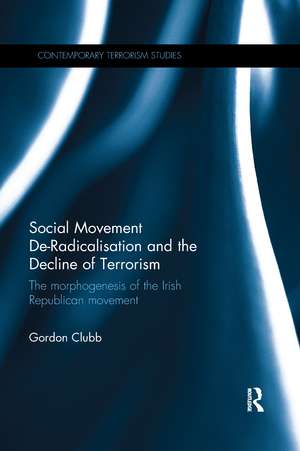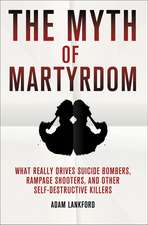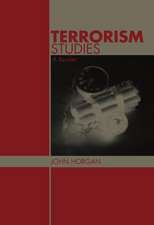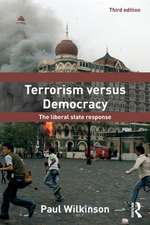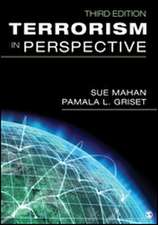Social Movement De-Radicalisation and the Decline of Terrorism: The Morphogenesis of the Irish Republican Movement: Contemporary Terrorism Studies
Autor Gordon Clubben Limba Engleză Paperback – 30 iun 2020
The continuity of terrorism and political violence from generation to generation demonstrates the need to go beyond a focus on groups or individuals in order to explain how terrorism ends. The concept of de-radicalisation has been critiqued for its lack of explanatory value in accounting for disengagement from terrorism or how the risk of terrorism re-emerging is reduced. However, building on the morphogenetic approach, this book distinguishes between structure/culture and agency over time in order to analyse the causal influence between the two. Two processes are analysed: disengagement framing processes explain how actors change attitudes to violence and the book identifies which factors ensure frames resonate with audiences; and social movement de-radicalisation accounts for the outcomes of disengagement in initiating structural change which transforms the landscape the next generation finds itself in. The fundamental aim of the book is to provide theoretical and conceptual insights into how terrorism can not only come to an end, but can be prevented from emerging to be a significant threat again within a society.
This book will be of much interest to students of terrorism and political violence, social movement theory, British and Irish Politics, war and conflict studies, security studies and IR in general.
| Toate formatele și edițiile | Preț | Express |
|---|---|---|
| Paperback (1) | 259.98 lei 6-8 săpt. | |
| Taylor & Francis – 30 iun 2020 | 259.98 lei 6-8 săpt. | |
| Hardback (1) | 819.09 lei 6-8 săpt. | |
| Taylor & Francis – 22 sep 2016 | 819.09 lei 6-8 săpt. |
Din seria Contemporary Terrorism Studies
- 27%
 Preț: 804.55 lei
Preț: 804.55 lei - 9%
 Preț: 935.38 lei
Preț: 935.38 lei - 8%
 Preț: 384.45 lei
Preț: 384.45 lei -
 Preț: 383.24 lei
Preț: 383.24 lei - 12%
 Preț: 299.52 lei
Preț: 299.52 lei -
 Preț: 486.17 lei
Preț: 486.17 lei - 18%
 Preț: 1053.47 lei
Preț: 1053.47 lei - 26%
 Preț: 847.73 lei
Preț: 847.73 lei -
 Preț: 432.29 lei
Preț: 432.29 lei - 18%
 Preț: 1004.20 lei
Preț: 1004.20 lei - 18%
 Preț: 1001.07 lei
Preț: 1001.07 lei -
 Preț: 467.44 lei
Preț: 467.44 lei -
 Preț: 448.44 lei
Preț: 448.44 lei - 26%
 Preț: 819.09 lei
Preț: 819.09 lei - 16%
 Preț: 276.70 lei
Preț: 276.70 lei - 28%
 Preț: 850.17 lei
Preț: 850.17 lei -
 Preț: 194.54 lei
Preț: 194.54 lei - 18%
 Preț: 1001.07 lei
Preț: 1001.07 lei - 12%
 Preț: 332.23 lei
Preț: 332.23 lei -
 Preț: 461.86 lei
Preț: 461.86 lei - 18%
 Preț: 704.83 lei
Preț: 704.83 lei - 26%
 Preț: 850.19 lei
Preț: 850.19 lei -
 Preț: 443.65 lei
Preț: 443.65 lei - 18%
 Preț: 1177.10 lei
Preț: 1177.10 lei -
 Preț: 407.40 lei
Preț: 407.40 lei -
 Preț: 410.46 lei
Preț: 410.46 lei - 18%
 Preț: 1050.02 lei
Preț: 1050.02 lei -
 Preț: 465.49 lei
Preț: 465.49 lei - 23%
 Preț: 299.87 lei
Preț: 299.87 lei - 16%
 Preț: 274.66 lei
Preț: 274.66 lei - 18%
 Preț: 1174.33 lei
Preț: 1174.33 lei -
 Preț: 317.52 lei
Preț: 317.52 lei - 31%
 Preț: 767.89 lei
Preț: 767.89 lei - 18%
 Preț: 949.88 lei
Preț: 949.88 lei
Preț: 259.98 lei
Preț vechi: 311.41 lei
-17% Nou
Puncte Express: 390
Preț estimativ în valută:
49.75€ • 51.94$ • 41.17£
49.75€ • 51.94$ • 41.17£
Carte tipărită la comandă
Livrare economică 04-18 aprilie
Preluare comenzi: 021 569.72.76
Specificații
ISBN-13: 9780367596033
ISBN-10: 0367596032
Pagini: 190
Dimensiuni: 156 x 234 mm
Greutate: 0.45 kg
Ediția:1
Editura: Taylor & Francis
Colecția Routledge
Seria Contemporary Terrorism Studies
Locul publicării:Oxford, United Kingdom
ISBN-10: 0367596032
Pagini: 190
Dimensiuni: 156 x 234 mm
Greutate: 0.45 kg
Ediția:1
Editura: Taylor & Francis
Colecția Routledge
Seria Contemporary Terrorism Studies
Locul publicării:Oxford, United Kingdom
Public țintă
Postgraduate, Professional, and UndergraduateCuprins
Introduction: Waves of Terrorism and Morphogenesis
1. A Social Movement Approach
2. The Irish Republican Movement
3. Framing Disengagement
4. The Disengagement Domino-Effect
5. The Next Generation
Conclusion: Social Movement De-Radicalisation
1. A Social Movement Approach
2. The Irish Republican Movement
3. Framing Disengagement
4. The Disengagement Domino-Effect
5. The Next Generation
Conclusion: Social Movement De-Radicalisation
Notă biografică
Gordon Clubb is Lecturer in International Security at the University of Leeds, UK, and Director of the Terrorism and Political Violence Association.
Recenzii
'Just when one thinks that everything has been said about the conflict in Northern Ireland since the Irish Republican movement has been the most thoroughly studied militant movement in recent times, here comes Gordon Clubb with a new book that places the conflict into a new framework, explaining both its inter-generational longevity and the ingredients for a lasting peace'. -- Alex P. Schmid, International Centre for Counter-Terrorism - The Hague, Netherlands
'Whether life in Northern Ireland will be shaped more by politics or violence remains a matter of past, present and future contention. This book represent a very impressive piece of research which helps us to a deeper understanding of the factors in play'. -- Clive Walker, University of Leeds, UK
'Very few works have the same level of solid scholarship and deep, comparative insights into the phenomena of deradicalisation'. -- Omar Ashour, University of Exeter, UK
'Gordon Clubb has written one of the most important deradicalization studies in recent years. By focusing on the much under-researched aspect of collective or social movement deradicalization Clubb closes theoretical and methodological gaps that have been pressing. Most significantly however, this impressive work does not only help to understand the peace process in Northern Ireland a lot better, but for the first time combines collective and individual deradicalization theories with a coherent and unique framework, which will surely set much needed research impulses for years to come. Essential reading for scholars and students of terrorism, radicalization, deradicalization and the Northern Ireland conflict.' -- Daniel Koehler, German Institute on Radicalization and De-Radicalization Studies
'Whether life in Northern Ireland will be shaped more by politics or violence remains a matter of past, present and future contention. This book represent a very impressive piece of research which helps us to a deeper understanding of the factors in play'. -- Clive Walker, University of Leeds, UK
'Very few works have the same level of solid scholarship and deep, comparative insights into the phenomena of deradicalisation'. -- Omar Ashour, University of Exeter, UK
'Gordon Clubb has written one of the most important deradicalization studies in recent years. By focusing on the much under-researched aspect of collective or social movement deradicalization Clubb closes theoretical and methodological gaps that have been pressing. Most significantly however, this impressive work does not only help to understand the peace process in Northern Ireland a lot better, but for the first time combines collective and individual deradicalization theories with a coherent and unique framework, which will surely set much needed research impulses for years to come. Essential reading for scholars and students of terrorism, radicalization, deradicalization and the Northern Ireland conflict.' -- Daniel Koehler, German Institute on Radicalization and De-Radicalization Studies
Descriere
The book provides an explanation of how movements which use terrorism decline by drawing on social movement theories, using the case of Irish Republicanism as an example which can be applied to other movements.
